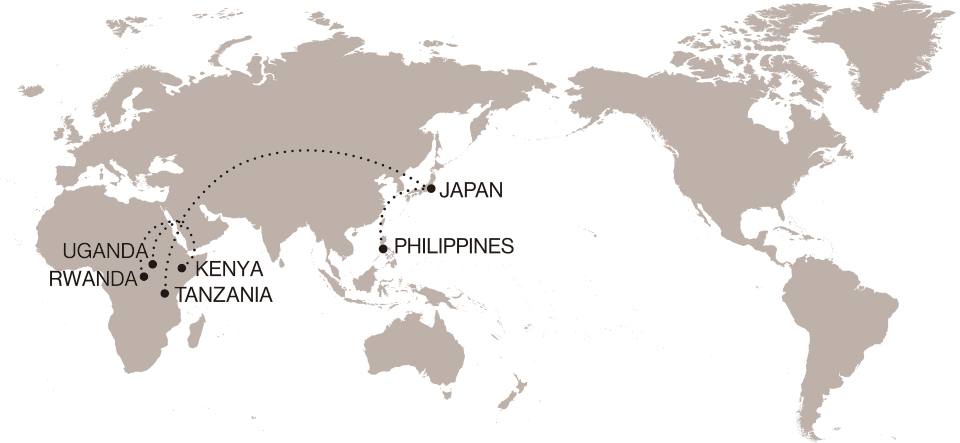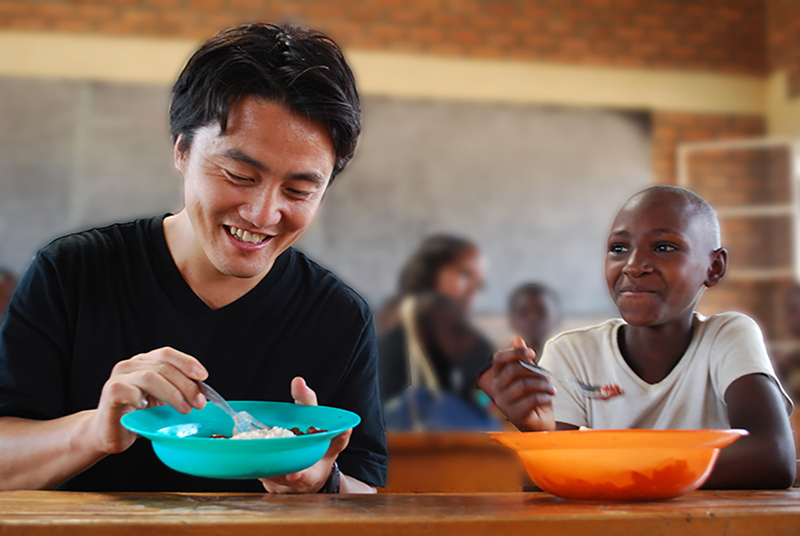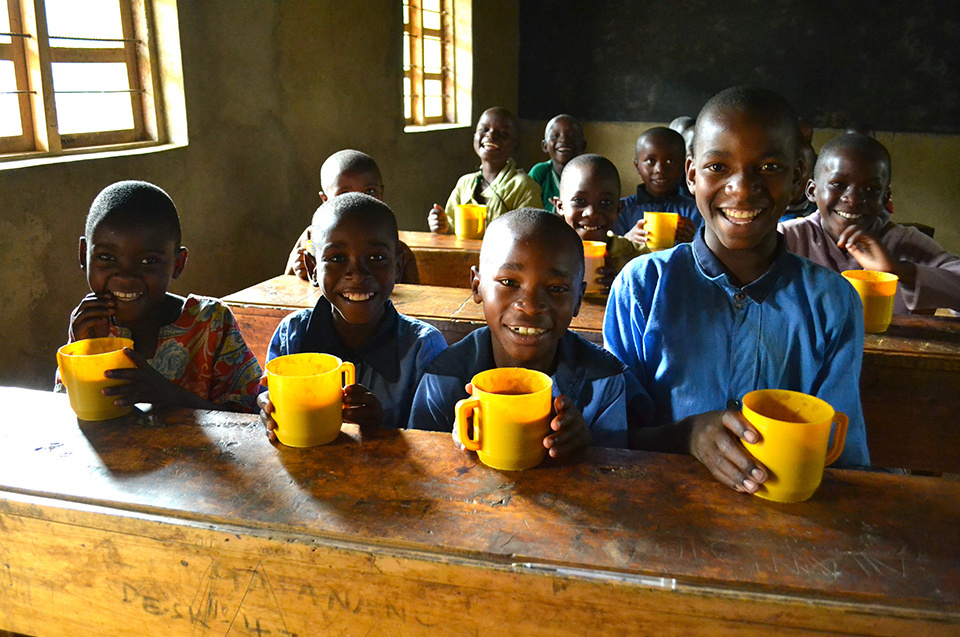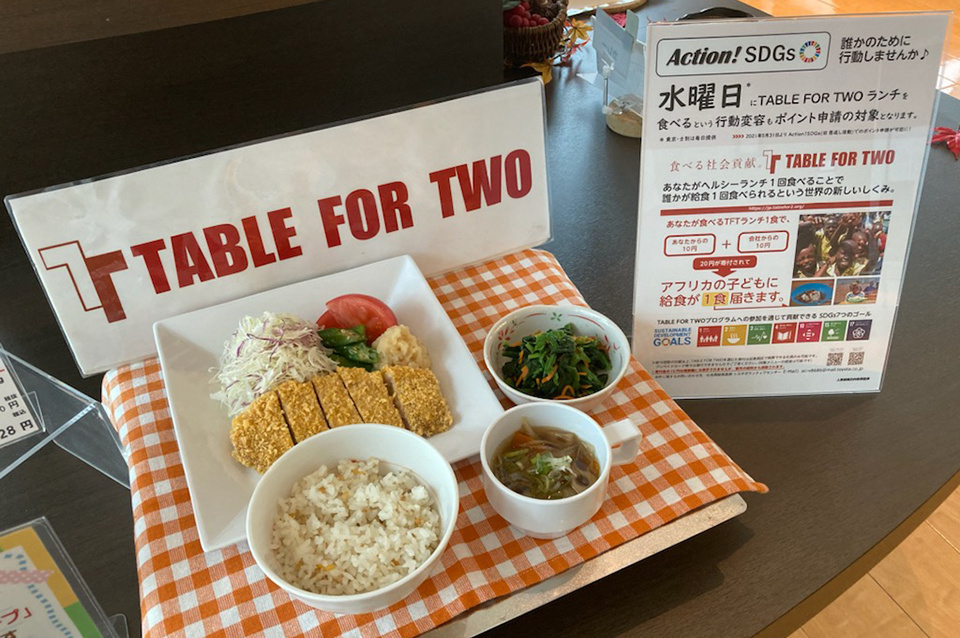Some people in the world today have difficulty getting enough food to eat, while others struggle with obesity as a result of eating too much. One Japanese NPO seeks to resolve that food imbalance, helping individuals on both ends of the spectrum.


KOGURE Masahisa of TFT is on the left. Although he has been unable to visit aid recipients during the pandemic, he has kept in close contact with NPO partners on the ground to keep abreast of the latest issues. TABLE FOR TWO
How wonderful would it be if two people—one living in a developed country and another in a developing country—were able to share their food equally? TABLE FOR TWO (TFT), a Japanese NPO established in 2007, has created a system to do just that. For each nutritionally balanced TFT meal selected by a diner at an employee cafeteria or a restaurant, a donation of 20 yen is generated. TFT works with partner organizations to turn that 20-yen donation into a school meal in a developing country.

Kogure says, “Food assistance increases educational opportunities. Our ultimate goal is to cut the chains of poverty.” TABLE FOR TWO

For every meal a diner eats from the TFT menu, a donation is made to a developing country. The photo shows a TFT meal at a Toyota Motor Corp. employee cafeteria. TOYOTA MOTOR CORP.
Many people in developing countries still cannot get enough food to obtain the nutrition they need to live. According to reports by UNICEF and other international organizations, since 2020, soaring food prices and distribution network disruptions caused by the rampant spread of COVID-19 have exacerbated the situation. As a result, about 10% of the world’s population is now underfed. To achieve the SDG of zero hunger by 2030, much remains to be done. Meanwhile, the percentage of obese people in developed countries continues to rise owing to higher calorie meals and a lack of exercise due to the prevalence of desk work.
Resolving that global food imbalance is TFT’s goal. According to its executive director, KOGURE Masahisa, “Many people can’t make big donations on a continual basis. That’s why TFT created a system that lets them contribute a little bit every day.” The amount of each donation is small and manageable and can therefore be included within the price of a single meal, making it possible for individuals to contribute while enjoying a delicious and healthy dish—these advantages to the system eliminate the psychological and economic obstacles blocking donations. As of April 2021, around 650 companies and organizations are involved with TFT. In addition, TFT has offices not only in Japan, but also in the U.S. and Germany, where it is recruiting more sponsors.
TFT helps serve school meals mainly in Uganda, Rwanda, Tanzania, Kenya, and the Philippines. With the donations collected in 2020, the organization delivered about 5.5 million school meals. More than just offering children better nutrition, those meals also provide the motivation both to attend school and to study while there. According to one of the students, “Thanks to the school meals, I can really focus on my studies.”
In addition to assistance with school meals, TFT helps plant vegetable gardens for schools and communities to create a sustainable food supply system. Kogure says, “We often hear from recipients that they want to be able to produce their own food rather than just relying on aid. But they lack the technology and funds. So, we started to help plant vegetable gardens with the idea of assisting them in producing food.” Along with improving food self-sufficiency and economic independence, such organically cultivated vegetable gardens provide places for teaching children about nutrition and food safety.

TFT helps local schools plant vegetable gardens to teach children how to make their own food. TABLE FOR TWO

Dietary education programs in the U.S. teach children lessons such as how to prepare nutritionally balanced Japanese food. TABLE FOR TWO
Kogure enthusiastically says, “We want to recruit partners beyond our own current field of activities so that we can provide even more assistance to developing countries.” As the waves of TFT’s influence spread, we will come much closer to a world without hunger or obesity.





























